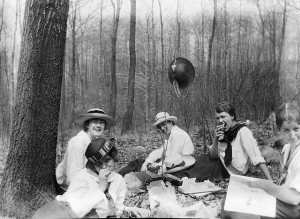To help students adapt to the changing job market, the AHA has begun a new series on searching for jobs and developing careers with a BA in history. This second post in the series focuses on career planning before you’ve earned your degree.
Intentional career planning is essential to success after graduation with a bachelor’s in history. Before beginning to think about entering the workforce, you need to know what options you have and what professions are a good fit for you. The great news is that a history BA can lead to a wide variety of options. While having many options is sometimes overwhelming, most find it reassuring to have several career possibilities.
One of the best ways to set yourself up for success when graduating is to develop career objectives with specific outcomes while you are in college. Ideally do this in your first or second year of college. No matter what your major, this is essential. So how do you get started? Developing self-awareness is an important first step in the process of defining a career goal. Think about interests, abilities, values, and personality through self-assessment activities. StrengthsFinder, Strong Interest Inventory, and Career Cruising are three of my favorite self-assessments, and your career center can help you get started with these resources. As you work through the process, ask yourself these questions: What are my greatest skills? Interests? What is important to me about work? What have I learned from my academics? Where do I want to live? What kind of lifestyle do I envision for myself?
Having a good old-fashioned conversation with friends and relatives is also a great start. Conduct a career poll: Ask four friends or relatives for five careers they can “see” you in. Then ask why they considered that occupation. Write down your initial reaction to the suggestions. Take stock of your greatest strengths. What are you good at? What value does that have to others?
Get involved as a first- and second-year student to better understand career options. Join an on-campus student organization related to your interests. Take advantage of affordable student membership rates and join a professional organization. Once a member, get to work! Be an active member and attend meetings.
Serve your community and volunteer for an organization that may offer jobs and internships later in your college career. This will help you to start thinking about what to do with a degree in history. It will also help you build your resume with experiences and talk to supervisors about what they seek in a new hire.
Take introductory courses in your major and related to your interest area. Pay attention to the connections to real-world experiences in your classes. Introduce yourself to alumni and class visitors and ask them questions about their career journey. Meeting others with a history degree allows you to connect and network. This might involve taking a risk and striking up a conversation with someone you don’t know, but the benefit of learning about their career decision-making process makes it worth it. Many of the people you talk to have “been there” and will enjoy talking with you about your choices.
If you don’t have a LinkedIn account yet, create one NOW. As you work on creating a robust, complete profile, manage your privacy settings. Turn off your activity broadcasts and select who can see your activity feed. Keep that activity private until you are ready to launch your profile. Once your profile is complete, then start searching alumni and history majors to see what professions they are working in and make those connections. Look at their past jobs too. It is important to remember that everyone starts somewhere and that a first job can lead to a fulfilling career. This is an easy and interesting way to do research and explore career options. Plus, you can make some connections to start networking.
In my next blog post for this series, I will talk about typical career options with a BA in history. Skills, combined with knowledge attained in coursework, will lead to a fulfilling career.
Previous post: Entering the Job Market with a BA in History
This post first appeared on AHA Today.
Staci Heidtke works as associate director of Career Services at the University of Wisconsin-Eau Claire. She has worked with history majors for several years and has had countless conversations with them about careers and the benefits of a liberal arts education.
This work is licensed under a Creative Commons Attribution-NonCommercial-NoDerivatives 4.0 International License. Attribution must provide author name, article title, Perspectives on History, date of publication, and a link to this page. This license applies only to the article, not to text or images used here by permission.




